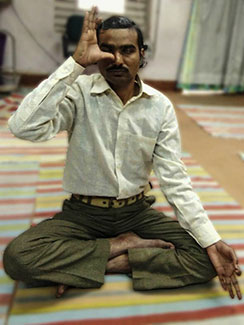
Focus on NCDs: Energizing psychiatric research in Egypt, India
November / December 2017 | Volume 16, Issue 6
By Karin Zeitvogel
Psychiatric research in Egypt and India has been "energized" by a five-year Chronic, Noncommunicable Diseases and Disorders Across the Lifespan (NCD-Lifespan)award from Fogarty, said grantee Dr. Vishwajit Nimgaonkar of the University of Pittsburgh. Topics of study range from mental functions and hepatitis C to mapping out ways to reduce the stigma of mental illness. The National Institute of Mental Health (NIMH) at NIH co-funded the award with Fogarty.
The program’s main focus is to train individuals from India and Egypt to conduct research to find novel, effective interventions for schizophrenia, a noncommunicable disorder that ranks in the top 25 causes of disability worldwide. Up to 85 percent of people in low- and middle-income countries (LMICs)who have a mental disorder, like schizophrenia, receive no treatment for it at all, and on the rare occasions that treatment is available, it often provides only symptomatic relief.

Photo by Hemant Pande
Research by a Fogarty trainee found that
yoga improved focus in people with
schizophrenia.
yoga improved focus in people with
schizophrenia.
"The absence of effective remedies and the slowed pace of new drug development compel the need for additional research strategies for schizophrenia," said Nimgaonkar, who launched the Fogarty-supported program in 2014. Some of the researchers’ work crosses over with other NIH-supported projects, including one investigating the heritability of schizophrenia - of special interest in Egypt, where marriage among relatives is common.
A key offshoot of the program was a "grant-a-thon" held in New Delhi in 2016. Around 25 trainees from India worked with faculty advisors from U.S., Indian and Egyptian universities to turn ideas for grants into applications. "We encouraged applicants to work together, to do multi-site studies. Twelve applications were written during the five-day workshop, and submitted to the Indian Council for Medical Research for funding," said Nimgaonkar.
In addition, several trainees have secured NIH funding, including Dr. Triptish Bhatia, whose research found yoga improved focus in people with schizophrenia. The National Center for Complementary and Integrative Health (NCCIH) and the NIH Office of Behavioral and Social Sciences Research (OBSSR) co-funded Bhatia's award, which was administered by Fogarty.
"We need to find ways to continue to identify talented individuals and help them stand on their own legs, in their own country," he said. "Without the help of Fogarty and the NIH, who thoughtfully engineer their grants so that they provide the maximum benefit, this wouldn’t be possible."
More Information
- Related grant awards in NIH RePORTER:
- Cross-Fertilized Research Training for New Investigators in Egypt and India
Principal investigators: Drs. Vishwajit Laxmikant Nimgaonkar, Smita N. Deshpande and Hader A. Mansour - The Impact of Yoga Supplementation on Cognitive Function Among Indian Outpatients
Principal investigator: Dr. Triptish Bhatia - Chronic, noncommunicable diseases (NCDs) information and resources from Fogarty
To view Adobe PDF files, download current, free accessible plug-ins from Adobe's website.


































No hay comentarios:
Publicar un comentario